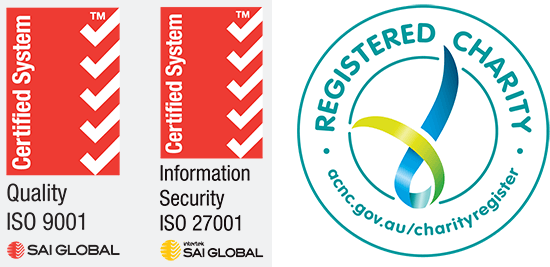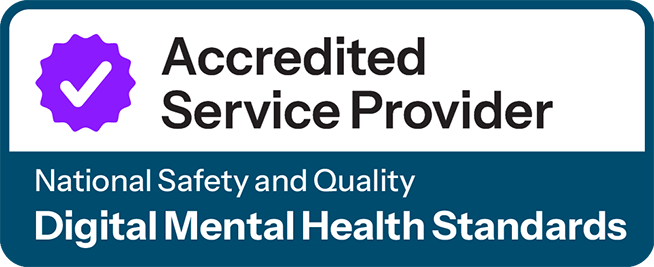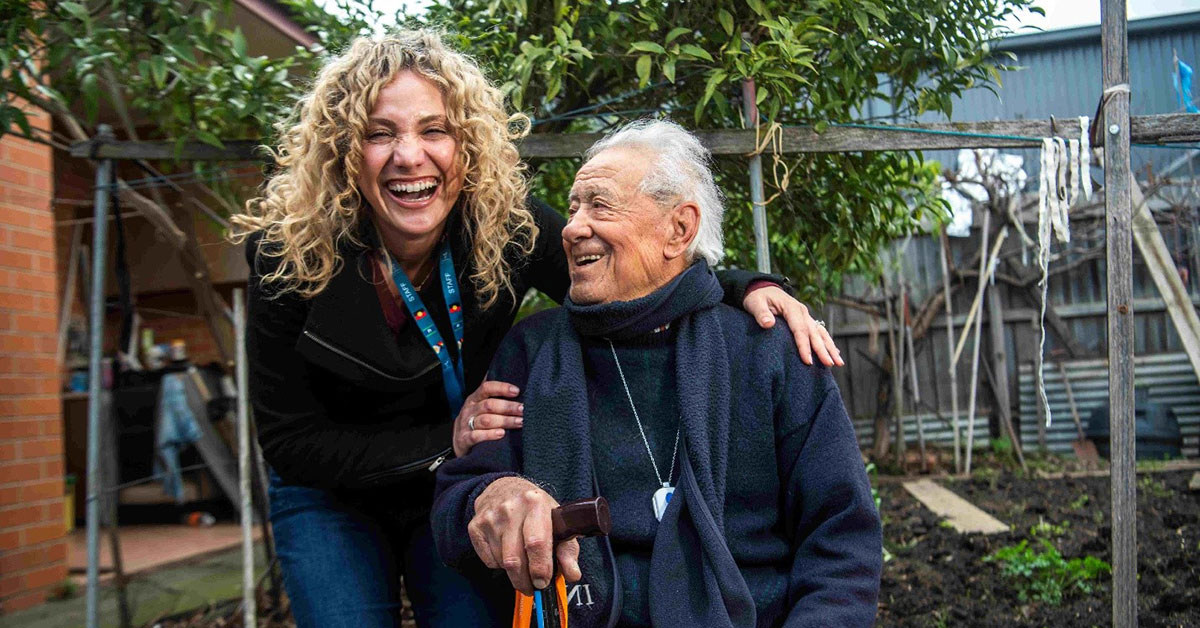
Many Australians find themselves in their later years alone and unable to navigate the complex aged care system or find other services they need.
To assist them, in January 2023 the Australian Government created care finder services. Care finders provide face-to-face support to help people understand and access the My Aged Care system and connect with other relevant supports in their community.
Vince, 67, and his then five-year-old cat Fluffy were homeless when another community organistion came into contact with him. They found housing for both but also referred him to Wintringham care finders, one of eight organisations that North Western Melbourne Primary Health Network (NWMPHN) commissions to provide more intensive support.
Wintringham’s Sherien Tadros set about organising an assessment through My Aged Care for him.
Vince began working in a foundry in Brunswick in the late 1960s when he was 14 years old. He stayed there for 32 years.
For the following decade he worked in a bakery, and was then a live-in carer for an elderly woman for the next 15 years. When his client passed away Vince lost a friend, a job and a home.
The home secured for him by the other community organisation was a walk-up flat in inner north Melbourne. The location was a bonus – it was near where he’d grown up and where his uncle and aunt once lived. Once he’d settled in, he walked down and found his cousin Mary – whom he had not seen for 40 years – still living in the family home.
Despite having stable housing and reuniting with family, the next 12 months grew tough. Increasingly frail, in April 2025 Vince had a stroke.
While he was in hospital relearning how to walk and talk, a fire gutted the flat next to his. Cousin Mary, who had been visiting twice a day to feed Fluffy, arrived to discover the apartment block badly damaged. There was no sign of the cat.
The emergency workers insisted it had been relocated. Mary, worried, made them check again. They did and found Fluffy, hiding. Sheepishly, they handed him over. Mary took him home.
Soon after, however, the cat stopped eating and drinking. Mary wondered if the toxic aftermath of the fire was to blame.
The local vet recommended admission to an animal hospital. There it was discovered that Fluffy had fluid on the lungs. Treatment would cost $3000 with no guarantee of success.
Mary secured a temporary discharge for Vince, so that he could say goodbye to his furry friend.
While this was all going on, Sherien at Wintringham was still trying to get him assessed for My Aged Care. Given the mobility impacts of the stroke, it was clear that a walk-up flat was no longer practical.
After much persistence, she managed to get him into a ground floor unit in Brunswick. There, he can look out of his bedroom and living room windows and see blue sky. Regular visitors include Mary, Sherien and a neighbour’s pampered ginger cat.
“It wasn’t easy,” Sherien recalls of the efforts to find alternative housing for Vince. After securing the unit, she then organised for utilities to connected, and help him pack and transport his belongings.
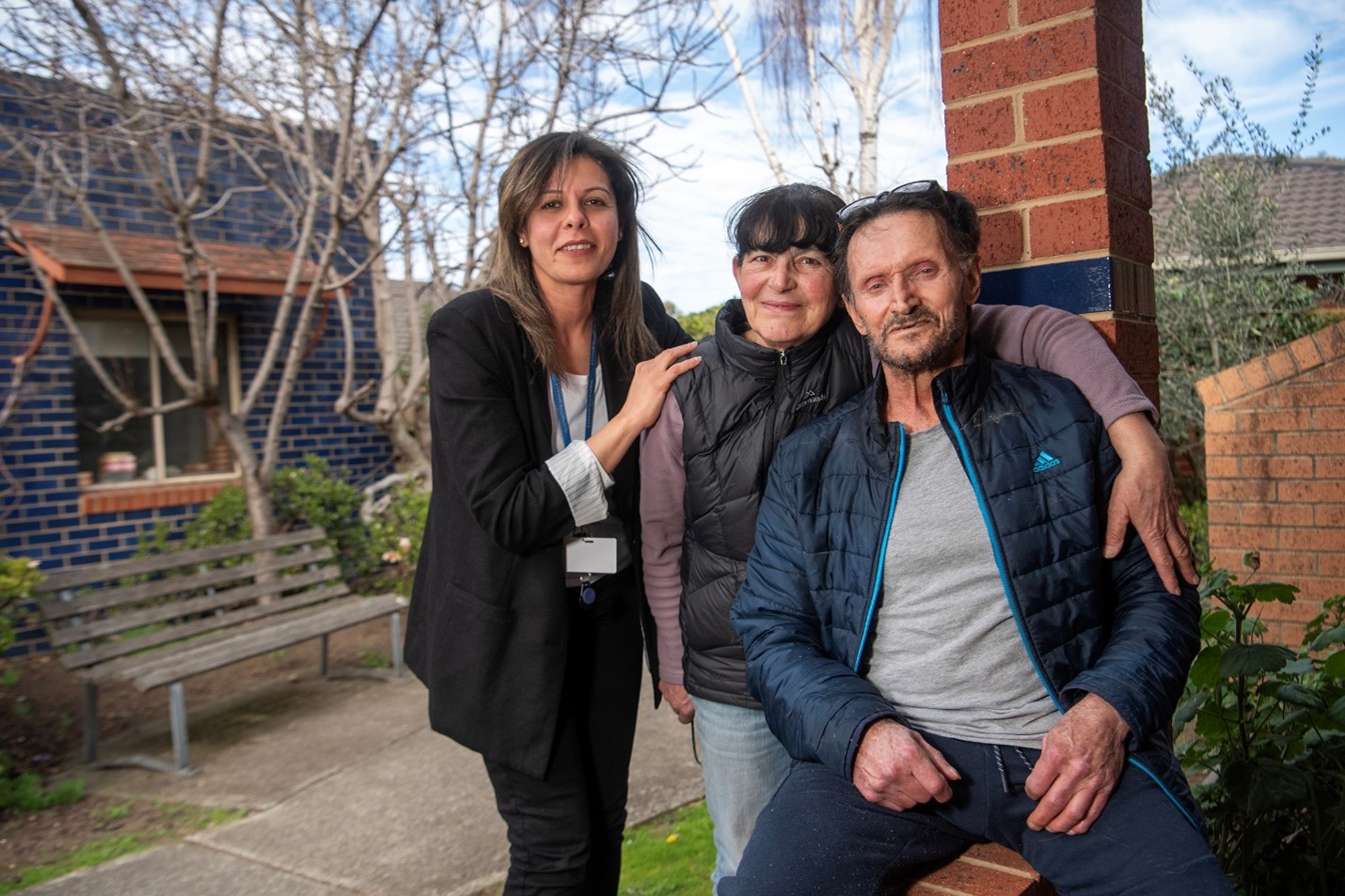
She was able to transfer his overdue aged care assessment to another assessing organisation that wasn’t as overwhelmed. (In Victoria assessments are done by health and community health organisations as well as Australian Government-contracted providers.)
Once assessment was completed, she was able to organise more help with personal care and cleaning. Separate negotiations secured Vince weekly home physiotherapy sessions to assist with stroke recovery.
Cousin Mary said she’d be lost without Sherien’s help. “She’s been marvellous,’’ she said.
The care finder program is tailored to each individual. Sometimes clients just need help to maintain their independence when family or friends are not available.
Penny Montuoro, a City of Darebin care finder, does this for Italo, still spry at 94, and living in his own home.
Italo has seen his Thornbury neighbourhood change immensely over the 70 years he has lived in the same street. Once he knew all the neighbours, but now he has outlived them all.
His beloved garden and fruit trees have been pared back as his ability to tend it has reduced. He is still gregarious and happy to share some of his many stories about coming to Australia.
Italo grew up in a village on a small farm in southern Italy with his four older brothers. When he was a boy of 10 or 11, all four were away, fighting in World War II.
“There were no bedside stories because my mother was always crying with four sons at war and my father was ill and had lost an eye,” he recalled.
“We had two or three pigs and a horse, so we didn’t go hungry but …”
All four siblings survived the war. One brother, a tank driver, was captured by the Germans (after 1943 when Italy split with Germany after Mussolini’s death) but escaped. “When he returned home he was 35 kilos,” said Italo.
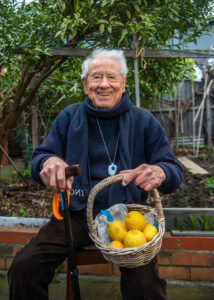
Italo travelled to Australia on a ship, leaving his village in the Abruzzo region when he was 21. One of his brothers was already here. Together, they moved into a rooming house on Victoria Parade in East Melbourne.
The first day at the house, Italo, who was better at cooking, went out to buy groceries while his brother went to find the shared shower room.
When Italo returned his brother was apparently still showering. He asked another resident to show him to the bathroom. His brother had collapsed, unconscious, because gas was leaking from the hot water heater. They got him to St Vincent’s hospital but 60 hours later he was declared dead.
He wrote to his parents in Italy but broke the news over two letters. The first said that his brother had been in an accident. The second letter revealed his death.
“I had nobody,’’ he said quietly. “We are like leaves of a tree that come every Spring and Autumn, and they drop and you don’t know where they end up, the wind takes them away.’’
He admits he took to drinking for a while but after waking up with a headache each day and “the problem was still there’’, he stopped.
He decided it was time to marry his fiancée, Maria, who lived in a village a few kilometres away from his in Abruzzo. She arrived in Melbourne in May 1955 and a year later they moved to Thornbury. The northern suburb wasn’t considered particularly desirable then, but there was a strong community, good neighbours and room for lots of fruit trees and vegetables.
He found work as an upholsterer, but stopped when Maria became ill. That was 34 years ago. He cared for her full time until she died two years later.
He spent the ensuing decades supporting five families, all of which, due to illness and accident, needed help with transport, gardening, cleaning or just a sympathetic ear.
One time an older friend managed to call before 6am. He’d suffered what turned out to be a stroke.
Italo was driving him to Epping hospital, speeding, when he was pulled over by the police. Rather than booking him, they turned on the sirens and escorted the car to the emergency department.
Care finder Penny Montuoro said Italo’s referral to her was unique.
“He was at the town hall trying to work out how to get help with aged care services and bumped into the mayor!” she said. “The mayor referred him to us.”
The care finder program was in its infancy at the time and Italo fitted into one of the priority population groups: culturally and linguistically diverse older adults with increasing complex health and social needs.
Penny said Italo was still very much “his own agent’’ but she has connected him with a home care package provider, backs his advocacy for improved services, helps him complete complicated paperwork and liaises with his son, who lives in Sydney.
“Working with Italo has been a deeply inspiring experience,” she said.
“I have developed immense respect for him, knowing the challenges he faced migrating to a new country without family or support.
“Despite these obstacles, he successfully built a strong community and became widely known for his generosity and willingness to help others in need. It was both a privilege and an honour to assist him … and to play a small part in his journey.”
Do you know someone who needs support from a care finder?
Care finder services operate across the entire NWMPHN region for vulnerable older people who need intensive support to access aged care and other local services. Eligibility criteria and more information are available on the My Aged Care website.
Anyone can contact a care finder organisation to seek support. We encourage GPs, mental health providers and other health and community service workers to refer eligible patients and clients to their local care finder service. Visit myagedcare.gov.au/help-care-finder for contact details.
Health professionals are encouraged to visit the Navigating Services for Older Adults page on HealthPathways Melbourne for more clinical and referral advice at the point of care.




